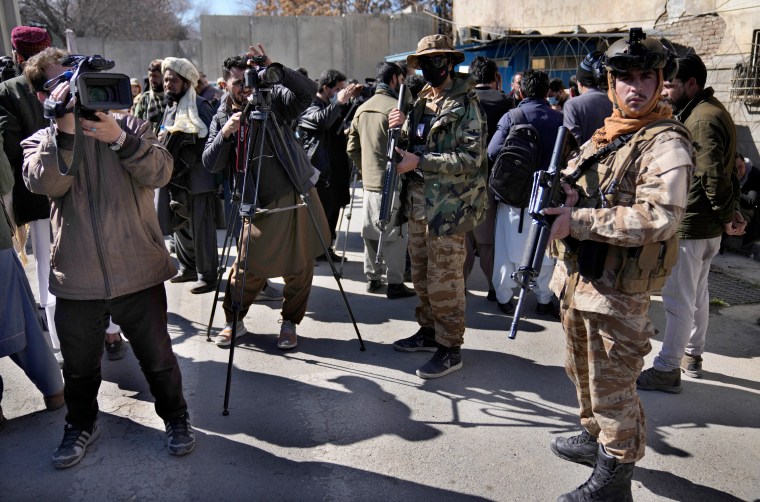New York, March 28, 2022 — The Taliban must cease detaining journalists for their work and lift all bans on news outlets’ operations, the Committee to Protect Journalists said Monday.
Since Saturday, March 26, Taliban forces have detained and then released at least seven journalists and media workers, and have ordered local outlets to stop airing content from three international broadcasters, according to news reports and people who spoke with CPJ.
“The Taliban must immediately release all the journalists who remain in their custody, and stop detaining members of the press once and for all,” said Steven Butler, CPJ’s Asia program coordinator, in Washington, D.C. “Such arbitrary detentions and recent bans on programming by several major international outlets are destroying the once-thriving media sector of the country and depriving the Afghan people of access to essential information.”
On Saturday, Taliban forces in Kandahar detained the independent local broadcaster Zema Radio’s director, Mirwais Atal, after raiding his home, according to media reports and the Afghanistan Journalists Center press freedom group. Authorities held Atal for about 15 hours before bringing him back to his home to retrieve his phone; they then transferred him to an undisclosed location, according to those sources.
At a meeting with local media executives the following day, the deputy director for media and public affairs at the Taliban’s General Directorate of Intelligence, Jawad Sargar, said that Atal was detained due to his “feministic viewpoints,” according to two senior media executives who attended that meeting and spoke to CPJ on the condition of anonymity.
Prior to his arrest, Atal had published commentary on his personal Facebook page, where he has about 5,660 followers, praising local protests by female students against Taliban orders to close girls’ schools.
On Monday evening, the AJC reported that Atal had been released from custody.
Also on Saturday, Taliban intelligence agents in Kabul’s District One detained Sarwar Hashemi, a journalist with the independent local broadcaster Salam Watandar, while he was covering a protest against the school closures, according to Salam Watandar and the AJC.
Authorities interrogated Hashemi for about six hours and then released him without charge, according to those sources.
During the Sunday meeting with local media executives at the Kandahar General Directorate of Intelligence office, Sargar ordered all major local broadcasters to cease airing music and entertainment live shows, as well as any programming that he claimed was against national and Islamic values, according to the two executives who spoke to CPJ.
Those executives said that Sargar gave them a two-hour deadline to comply, but the executives refused and demanded a written directive from the Taliban senior leaders or ministries.
On Monday, Taliban intelligence agents raided the Kandahar-based independent radio station Millat Zhagh and detained news manager Farid Alizai, producer Rahimullah Noori, and technical chief Mahmood Mehraban, and shut down the outlet and sealed its office, according to the AJC and a senior executive with the outlet, who spoke to CPJ on the condition of anonymity, citing fear of retaliation by the Taliban.
Authorities accused the three of failing to abide by Sargar’s ultimatum, according to those sources. On Monday evening, the journalists were released, according to a report by the AJC.
In additional raids on Monday to enforce Sargar’s order, Taliban intelligence agents in Kandahar also detained three other employees of independent local broadcasters: Sanga Radio manager Agha Sher Menar, Zema Radio administrative manager Waris Noori, and Radio Tabassum producer Samiullah Wahdat, according to the AJC and media reports which CPJ reviewed but have since been taken down.
Authorities held the three for several hours and then released them on bail, after forcing them to sign letters vowing to abide by the Taliban’s directives, Kandahar Press Club director Jawed Tanwir told CPJ via messaging app.
Separately, Taliban authorities on Sunday barred local broadcasters from airing Pashto, Persian, and Uzbek programming from British public broadcaster the BBC, the U.S. Congress-funded broadcaster Voice of America, and German public broadcaster Deutsche Welle, according to media reports and statements from the BBC, VOA, and DW.
The Shamshad, Ariana, and Arezo broadcasters have aired programming from the BBC, while TOLOnews has aired VOA programming, and Shamshad, Ariana, and TOLOnews have aired programming from DW, according to those reports.
The latest attacks on press freedom in Afghanistan coincide with a reported effort by Taliban leaders to turn back the clock to the repressive policies of the 1990s.
CPJ contacted Sargar for comment via messaging app, but did not receive any response. CPJ has documented the increasingly prominent role of the General Directorate of Intelligence in controlling news media and intimidating journalists in Afghanistan.
CPJ is also investigating reports that the Taliban had detained Radio Nawroz journalist and poet Khalid Qaderi; CPJ was unable to immediately determine if he was being held for his work as a journalist.
